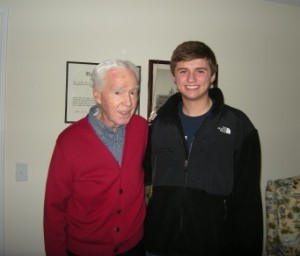
Westborough – A group of Westborough High School (WHS) students has been talking to local senior citizens as a way of ensuring that the elders” stories have been written down, in order to be preserved and shared with future generations.
The project called, “A Story to Tell,” was founded by WHS senior Michael Colbert, who was inspired to document stories after enjoying many hours talking with his mother's great-uncle, Stelio Repola. (For more information on “A Story to Tell,” go to http://communityadvocate.com/2011/10/01/westborough-high-school-students-hope-to-hear-seniors%e2%80%99-stories/.
Here is Westborough resident Ralph Smith's story, as told to Colbert.
“Who is scribbling on my calendar?”
“I’m sorry sir, that's my doing,” Ralph Smith told the lieutenant. “That's shorthand.”
Although Ralph's propensity for short hand earned him some attention from this lieutenant in the Navy, it was one of his gifts from a young age. In high school, Ralph excelled in his typing and shorthand class and his work was so exemplary that his teacher boasted his talents for others to see on parents’ nights. Initially, he learned Pitman shorthand but he later took up Gregg shorthand which helped him throughout his life. His knack for shorthand helped him become a third class petty officer in the Navy.
Ralph wanted to join the Navy ever since he was a boy. He delivered newspapers on their ships and often saw sailors by the Navy Yard in Charlestown, Massachusetts where he grew up. In 1941 he was living at a boardinghouse and working in Washington, DC. He saw men in uniform right after the Pearl Harbor attack and decided to enlist in the Navy. Although he was initially rejected, he was later accepted and assigned to Norfolk, Virginia. His first assignment was on a repair ship, the Admiral's Flagship USS Alcor, where his talent for shorthand was noticed by the lieutenant. A few days later, the lieutenant offered him a transfer to the USS Quincy at Fore River Shipyard in Quincy, Massachusetts which Ralph instantly accepted.
The USS Quincy, after some initial preparations, went to Belfast, Northern Ireland. Ralph was lucky enough to see General Dwight D. Eisenhower on board to inspect the ship. A few days later was D Day. The USS Quincy engaged in shore batteries and Ralph was assigned to the open bridge to assist in communication on the ship as a captain's talker. This was a highly exposed station as he and his companions had to shield themselves from shells and the hot air constantly blowing from the ship. From this vantage point, he was also able to see all of the damage of the battle.
As the Executive Officers Yeoman's Assistant, Ralph was able to see several dignitaries during his service such as President Franklin Roosevelt, his daughter Anna Boettiger, and Winston Churchill among others. President Roosevelt found passage to Malta on the USS Quincy to meet with Churchill for the Malta Conference. Although Roosevelt was always surrounded by security, Ralph was able to see him a few times and the President kindly acknowledged him.
The USS Quincy was one of the few ships to sail in both the Atlantic and Pacific oceans during World War II. In Japan, the sailors helped with bombing and after the atomic bombing of Hiroshima, Ralph could see white flags lining the shore next to the Japanese guns from a half mile away while on the ship. After demilitarizing some of the islands, Ralph returned home.
Once back in Boston, Ralph graduated from Boston University and Boston College Law School under the GI Bill. He was married in Roxbury, Massachusetts in 1949 to Margaret Kenneally and had four children. With his law degree, he was a trial attorney in deportations for illegal aliens for the U.S. Immigration and Naturalization Service. Ironically, he later retired from the government agency and joined the firm of his biggest opponent.
Ralph is now involved in the Board of Government in his condominium complex and has helped since 2002 during the complex's development. Ralph's time in the Navy still helps him whenever there are disputes on this council. He says, “I think being in the service made it much easier to associate or acclimate and deal with people. When you’re on the ship, what you do on the ship affects everybody else.”

















